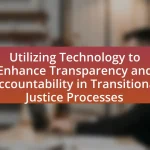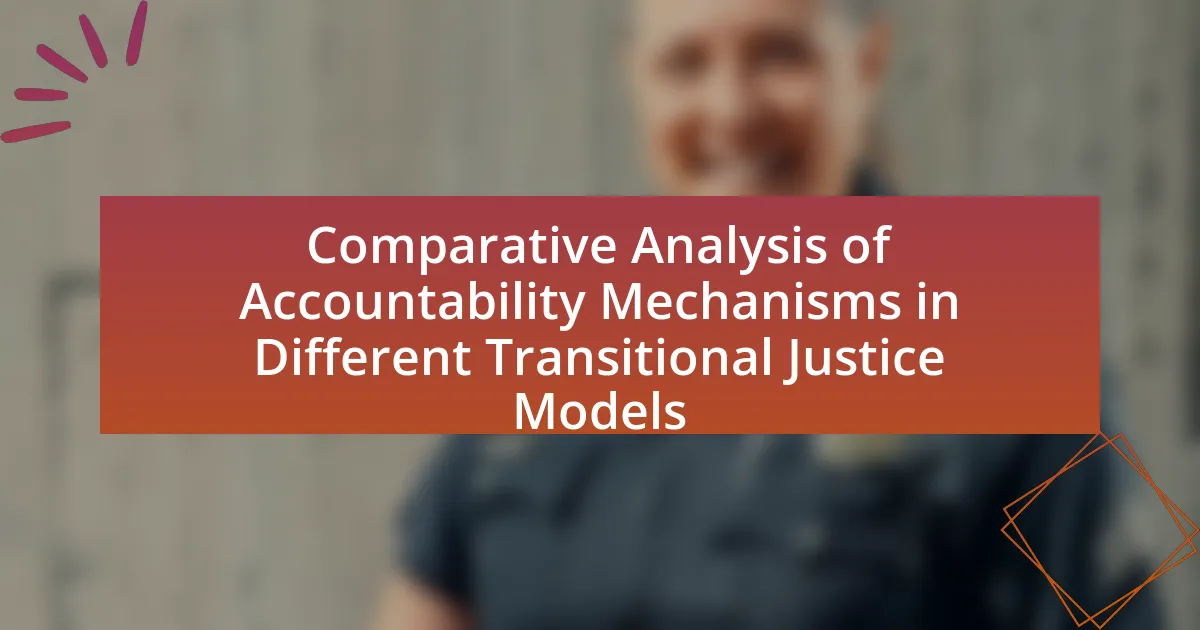The article examines the critical role of political will in determining the success of accountability mechanisms within transitional justice frameworks. It highlights how strong political commitment can lead to effective legal frameworks, resource allocation, and public support, as evidenced by South Africa’s Truth and Reconciliation Commission. Conversely, a lack of political will can result in impunity and ineffective justice systems, as seen in countries like Syria. Key components of political will, such as leadership, public support, and institutional capacity, are discussed, along with strategies to enhance political commitment and improve accountability mechanisms. The article emphasizes that the presence or absence of political will is a decisive factor in achieving justice and reconciliation in post-conflict societies.
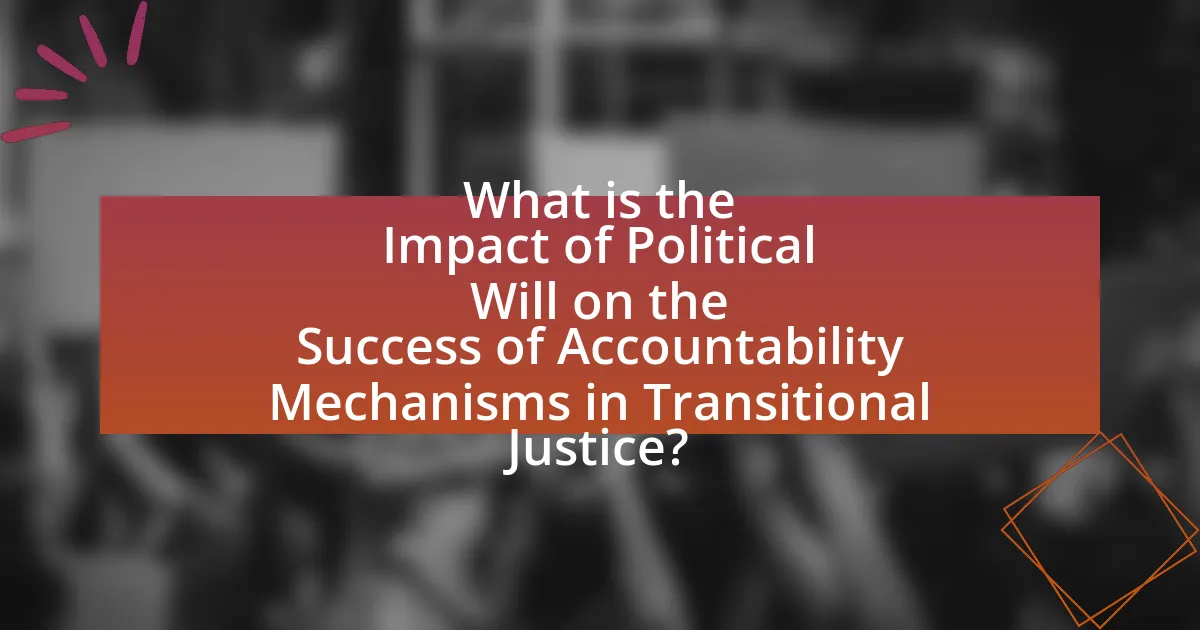
What is the Impact of Political Will on the Success of Accountability Mechanisms in Transitional Justice?
Political will significantly influences the success of accountability mechanisms in transitional justice by determining the extent to which governments and institutions commit to addressing past human rights violations. When political leaders demonstrate a strong commitment to accountability, it often leads to the establishment of effective legal frameworks, the allocation of necessary resources, and the mobilization of public support for justice initiatives. For instance, in South Africa, the political will exhibited by Nelson Mandela and the African National Congress facilitated the Truth and Reconciliation Commission, which played a crucial role in addressing apartheid-era crimes. Conversely, a lack of political will can result in impunity, as seen in countries like Syria, where the government has actively obstructed accountability efforts. Thus, the presence or absence of political will is a decisive factor in the effectiveness of transitional justice mechanisms.
How does political will influence the effectiveness of accountability mechanisms?
Political will significantly influences the effectiveness of accountability mechanisms by determining the commitment of leaders to uphold justice and enforce laws. When political leaders demonstrate strong support for accountability, it fosters an environment where mechanisms can operate effectively, leading to the prosecution of offenders and the protection of victims’ rights. For instance, in countries like South Africa, the political will exhibited during the Truth and Reconciliation Commission facilitated a comprehensive approach to addressing past human rights violations, resulting in greater public trust in the justice system. Conversely, a lack of political will can lead to impunity, as seen in various Latin American countries where leaders obstruct accountability efforts, undermining the mechanisms designed to promote justice. Thus, the presence or absence of political will directly correlates with the success or failure of accountability mechanisms in transitional justice contexts.
What are the key components of political will in the context of transitional justice?
The key components of political will in the context of transitional justice include commitment to accountability, public support, institutional capacity, and leadership. Commitment to accountability involves the determination of political leaders to address past human rights violations through legal and institutional mechanisms. Public support is crucial as it reflects the society’s demand for justice and can influence political leaders’ decisions. Institutional capacity refers to the ability of governmental and judicial systems to implement transitional justice measures effectively. Leadership is essential for driving the agenda forward, as strong leaders can mobilize resources and foster a culture of accountability. These components are validated by numerous case studies, such as South Africa’s Truth and Reconciliation Commission, which demonstrated that political will significantly impacts the effectiveness of transitional justice initiatives.
How does political will affect public trust in accountability mechanisms?
Political will significantly influences public trust in accountability mechanisms by determining the commitment of leaders to uphold justice and transparency. When political leaders demonstrate genuine intent to support accountability, it fosters a sense of reliability among the public, enhancing their trust in these mechanisms. For instance, in post-conflict societies, the establishment of truth commissions often hinges on political will; countries like South Africa, where leaders actively supported the Truth and Reconciliation Commission, saw higher public trust in the process compared to nations where political support was lacking. This correlation underscores that robust political will can lead to effective accountability measures, thereby reinforcing public confidence in the system.
Why is political will essential for the success of transitional justice initiatives?
Political will is essential for the success of transitional justice initiatives because it drives the commitment of government and institutional actors to implement reforms and accountability measures. Without political will, initiatives such as truth commissions, reparations, and prosecutions often lack the necessary support, resources, and legitimacy to function effectively. Historical examples, such as the post-apartheid South Africa Truth and Reconciliation Commission, demonstrate that strong political backing can facilitate public engagement and cooperation, leading to more successful outcomes in addressing past injustices. Conversely, in contexts where political will is absent, such as in some Latin American countries, transitional justice efforts have frequently stalled or failed, highlighting the critical role that political commitment plays in achieving justice and reconciliation.
What role does political will play in the implementation of justice reforms?
Political will is crucial for the successful implementation of justice reforms, as it determines the commitment of government leaders to prioritize and support these changes. When political leaders demonstrate strong political will, they allocate necessary resources, enact supportive legislation, and foster an environment conducive to reform. For instance, in countries like South Africa, the political will exhibited by leaders during the transition from apartheid facilitated the establishment of the Truth and Reconciliation Commission, which was essential for addressing past injustices. Conversely, a lack of political will can lead to stalled reforms, as seen in various nations where leaders resist accountability measures, undermining the effectiveness of justice systems. Thus, political will directly influences the pace and success of justice reforms by shaping the political landscape and institutional responses.
How can a lack of political will hinder accountability mechanisms?
A lack of political will can significantly hinder accountability mechanisms by preventing the implementation of necessary reforms and actions. When political leaders do not prioritize accountability, they may resist or obstruct investigations into human rights violations, limit access to justice for victims, and fail to support legal frameworks that promote transparency. For instance, in countries where political leaders lack commitment, such as in certain post-conflict settings, accountability mechanisms often remain underfunded and ineffective, leading to impunity for perpetrators. This lack of enforcement and support undermines public trust in institutions and perpetuates cycles of violence and injustice, as seen in various transitional justice processes where political will was crucial for success.
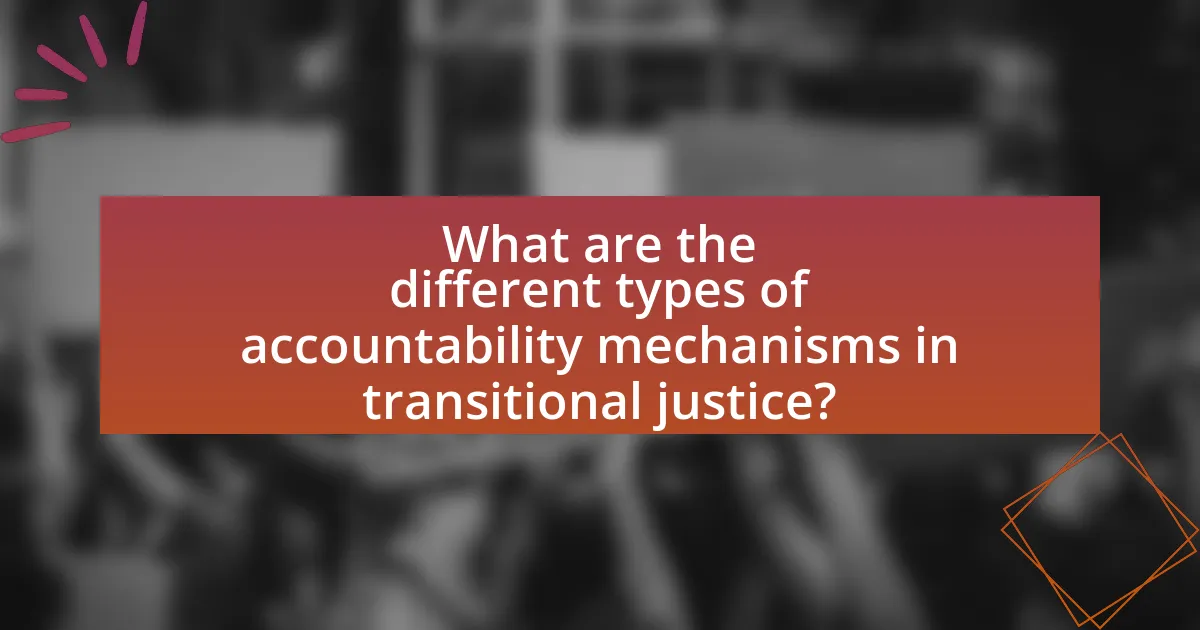
What are the different types of accountability mechanisms in transitional justice?
The different types of accountability mechanisms in transitional justice include criminal prosecutions, truth commissions, reparations programs, and institutional reforms. Criminal prosecutions hold individuals accountable for human rights violations through legal proceedings, exemplified by the International Criminal Court’s role in prosecuting war crimes. Truth commissions, such as South Africa’s Truth and Reconciliation Commission, aim to uncover the truth about past abuses and promote healing. Reparations programs provide compensation to victims, acknowledging their suffering and facilitating recovery. Institutional reforms focus on restructuring governmental and legal systems to prevent future violations, as seen in various post-conflict societies. Each mechanism plays a crucial role in addressing past injustices and fostering societal healing.
How do various accountability mechanisms operate within transitional justice frameworks?
Various accountability mechanisms within transitional justice frameworks operate through judicial processes, truth commissions, reparations programs, and institutional reforms. Judicial processes, such as trials for war crimes and human rights violations, aim to hold perpetrators accountable and provide justice to victims, exemplified by the International Criminal Court’s prosecutions. Truth commissions, like South Africa’s Truth and Reconciliation Commission, seek to uncover the truth about past atrocities, promote healing, and foster national reconciliation. Reparations programs provide financial or symbolic compensation to victims, acknowledging their suffering and restoring dignity, as seen in the reparations awarded in Argentina for victims of state terrorism. Institutional reforms focus on restructuring governmental and security institutions to prevent future abuses, which is critical for establishing the rule of law and rebuilding public trust. Each mechanism’s effectiveness is significantly influenced by the political will of governing bodies, as demonstrated in various case studies where lack of political commitment led to inadequate implementation and limited success in achieving justice and reconciliation.
What are the differences between judicial and non-judicial accountability mechanisms?
Judicial accountability mechanisms involve formal legal processes, such as courts and tribunals, that enforce laws and hold individuals accountable for violations, while non-judicial accountability mechanisms include informal processes, such as truth commissions and community-based initiatives, that seek accountability outside the traditional legal framework. Judicial mechanisms are characterized by their reliance on established legal standards and procedures, often resulting in legally binding outcomes, whereas non-judicial mechanisms focus on restorative justice, reconciliation, and public acknowledgment of wrongdoing, which may not have legal enforceability. For example, the International Criminal Court represents a judicial mechanism, while the South African Truth and Reconciliation Commission exemplifies a non-judicial approach.
How do truth commissions contribute to accountability in transitional justice?
Truth commissions contribute to accountability in transitional justice by uncovering the truth about past human rights violations and promoting public acknowledgment of these events. They facilitate the documentation of abuses, which helps to establish a historical record and validate the experiences of victims. For instance, the South African Truth and Reconciliation Commission, established in 1995, revealed extensive human rights violations during apartheid, leading to greater societal awareness and accountability for perpetrators. By providing a platform for victims to share their stories, truth commissions foster a culture of accountability and encourage legal and political reforms aimed at preventing future abuses.
What challenges do accountability mechanisms face in the absence of political will?
Accountability mechanisms face significant challenges in the absence of political will, primarily including lack of enforcement, insufficient resources, and diminished public trust. Without political will, governments often fail to implement or support accountability measures, leading to ineffective legal frameworks and inadequate institutional capacity. For instance, in countries like Syria, the absence of political commitment has resulted in a lack of prosecutions for war crimes, undermining justice efforts. Additionally, without political backing, funding for accountability initiatives is often cut, limiting their operational effectiveness. This lack of support can also erode public trust in these mechanisms, as citizens may perceive them as ineffective or biased, further complicating efforts to achieve justice and accountability.
How does political instability impact the functioning of accountability mechanisms?
Political instability significantly undermines the effectiveness of accountability mechanisms by creating an environment where governance is unpredictable and often unresponsive. In such contexts, institutions responsible for enforcing accountability may become weakened or co-opted by political actors seeking to maintain power, leading to a lack of transparency and diminished public trust. For instance, during periods of political turmoil, such as the Arab Spring, many countries experienced a breakdown in judicial independence, which directly affected the ability of courts to hold officials accountable for corruption or human rights abuses. This illustrates that political instability not only disrupts the operational capacity of accountability mechanisms but also erodes the foundational principles of rule of law necessary for their success.
What are the consequences of ineffective accountability mechanisms on society?
Ineffective accountability mechanisms lead to widespread corruption, erosion of public trust, and perpetuation of human rights abuses in society. When accountability systems fail, individuals in positions of power often act with impunity, undermining the rule of law and fostering an environment where unethical behavior is normalized. For instance, according to Transparency International, countries with weak accountability frameworks experience higher levels of corruption, which can diminish economic growth and exacerbate social inequalities. Furthermore, the lack of accountability can result in a cycle of violence and injustice, as seen in various transitional justice contexts where victims remain without redress, leading to societal unrest and a breakdown of social cohesion.
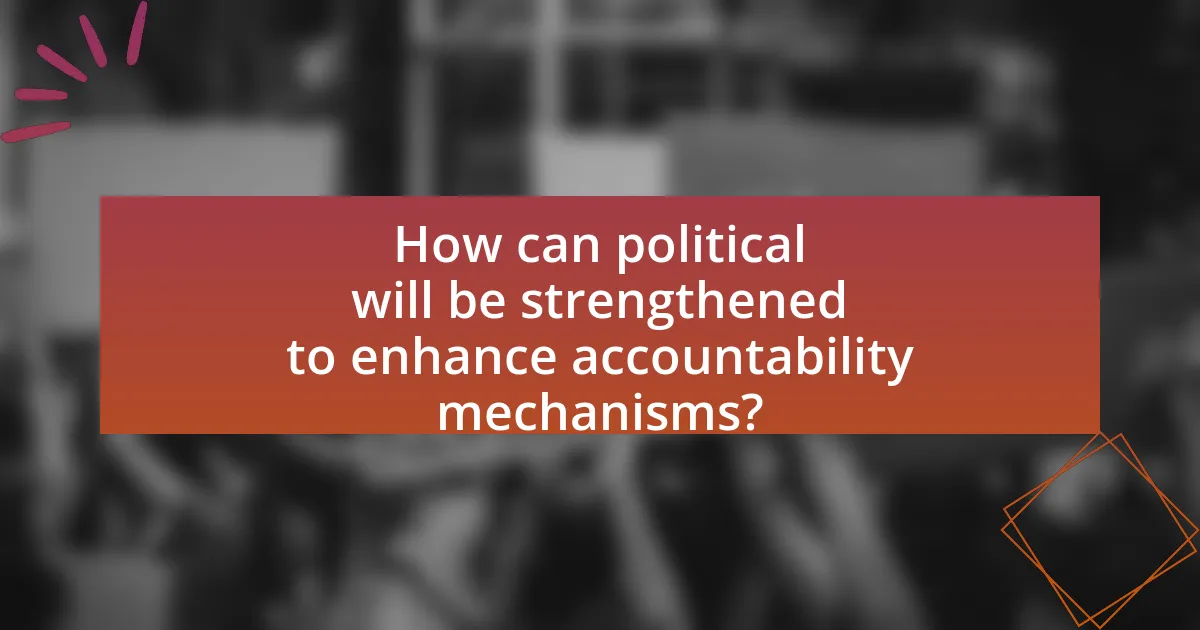
How can political will be strengthened to enhance accountability mechanisms?
Political will can be strengthened to enhance accountability mechanisms by fostering a culture of transparency and civic engagement. This can be achieved through the implementation of policies that promote public participation in governance, such as open forums and community consultations, which have been shown to increase trust in institutions. For instance, the United Nations Development Programme (UNDP) emphasizes that inclusive decision-making processes lead to greater accountability and responsiveness from political leaders. Additionally, establishing independent oversight bodies with the authority to investigate and report on government actions can further reinforce political will, as seen in countries like South Africa, where the Public Protector’s office has played a crucial role in holding officials accountable.
What strategies can be employed to foster political will for transitional justice?
To foster political will for transitional justice, strategies such as building broad coalitions, engaging civil society, and ensuring inclusive dialogue are essential. Broad coalitions that include various stakeholders, such as victims, political leaders, and international organizations, can create a unified front that pressures governments to commit to transitional justice. Engaging civil society organizations helps amplify the voices of victims and mobilizes public support, which can influence political leaders to prioritize justice initiatives. Additionally, inclusive dialogue that incorporates diverse perspectives fosters trust and encourages political actors to embrace transitional justice as a necessary step for national healing and stability. Historical examples, such as South Africa’s Truth and Reconciliation Commission, demonstrate how these strategies can effectively mobilize political will and lead to successful accountability mechanisms.
How can civil society organizations influence political will?
Civil society organizations can influence political will by mobilizing public opinion, advocating for policy changes, and holding governments accountable. These organizations often engage in grassroots campaigns that raise awareness about social issues, thereby creating pressure on political leaders to respond. For instance, the Arab Spring demonstrated how civil society mobilization can lead to significant political change, as citizens demanded accountability and reform. Additionally, studies show that civil society advocacy can lead to the adoption of policies that align with public interests, as seen in the successful campaigns for human rights legislation in various countries. By leveraging media, forming coalitions, and utilizing strategic litigation, civil society organizations effectively shape the political landscape and encourage leaders to prioritize accountability in transitional justice processes.
What role does international support play in strengthening political will?
International support plays a crucial role in strengthening political will by providing resources, legitimacy, and pressure for reform. When international entities, such as governments or organizations, offer financial aid, technical assistance, or diplomatic backing, they create an environment conducive to political commitment. For instance, the International Criminal Court’s involvement in various countries has often led to increased domestic political will to address human rights violations, as seen in the cases of post-conflict nations like Sierra Leone and Rwanda. This support not only incentivizes local leaders to prioritize accountability mechanisms but also enhances their credibility and legitimacy in the eyes of the public and the international community.
What best practices can be adopted to ensure the success of accountability mechanisms?
To ensure the success of accountability mechanisms, establishing clear legal frameworks is essential. Clear laws define the scope and processes of accountability, which helps in setting expectations and guiding actions. For instance, countries like South Africa have implemented specific legislation to support transitional justice, which has facilitated accountability for past human rights violations. Additionally, fostering political will among leaders is crucial, as demonstrated by the effectiveness of accountability mechanisms in nations where political leaders actively support justice initiatives, such as in Rwanda post-genocide. Engaging civil society and victims in the accountability process enhances transparency and trust, as seen in the Truth and Reconciliation Commission in Canada, which involved diverse community stakeholders. Regular monitoring and evaluation of accountability mechanisms also contribute to their success, as evidenced by the ongoing assessments conducted by organizations like Human Rights Watch, which provide feedback for improvement.
How can stakeholder engagement improve the effectiveness of accountability mechanisms?
Stakeholder engagement enhances the effectiveness of accountability mechanisms by fostering transparency, inclusivity, and trust among involved parties. When stakeholders, including victims, civil society, and government entities, actively participate in the design and implementation of accountability measures, they contribute diverse perspectives that can lead to more comprehensive and contextually relevant solutions. Research indicates that inclusive processes increase public confidence in accountability systems, as seen in the case of South Africa’s Truth and Reconciliation Commission, where stakeholder involvement was crucial in addressing past injustices and promoting societal healing. This engagement not only legitimizes the mechanisms but also encourages collective ownership, which is essential for sustained accountability in transitional justice contexts.
What lessons can be learned from successful transitional justice cases?
Successful transitional justice cases demonstrate that strong political will is essential for effective accountability mechanisms. For instance, South Africa’s Truth and Reconciliation Commission (TRC) illustrates how political commitment to reconciliation can facilitate healing and justice after apartheid. The TRC’s establishment was backed by the government, which allowed for public testimonies and acknowledgment of past atrocities, leading to a broader societal acceptance of the need for justice. Additionally, the case of Rwanda post-genocide shows that political leadership can drive the establishment of legal frameworks, such as the Gacaca courts, which enabled community-based justice and reconciliation. These examples highlight that without political will, transitional justice efforts may falter, as seen in countries where leaders lack commitment, resulting in stalled processes and unaddressed grievances.

